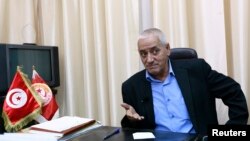TUNIS —
Tunisia's ruling Islamists and opposition parties reached a deal on Thursday to name a new prime minister for a caretaker administration until elections next year as a way to end months of crisis, mediators said on Thursday.
Hussein Abassi, head of the powerful UGTT labor union negotiating between the two sides, said an accord had been reached, but details would only be given on Friday.
A deal on a new prime minister would clear the way for the current government to step down later this month and end turmoil that has threatened to upset Tunisia's transition to full democracy three years after its “Arab Spring” uprising.
Seven major parties, including moderate Islamist party Ennahda and the main opposition bloc, the Nida Tounes party, held talks on Wednesday and negotiations continued through Thursday to work out a deal.
Political parties are split over the role of Islam. Tunisia's economy is faltering and Islamist militants have carried out a series of attacks.
Under a deal brokered by the UGTT, Ennahda has agreed to step down but only once the two sides agree on a premier and a caretaker cabinet, finish their new constitution and set a date for elections next year.
Worries from Tunisia's international lenders about the country's deficit and the assassinations of two opposition leaders by Islamist militants earlier this year have increased pressure to reach an accord.
Hussein Abassi, head of the powerful UGTT labor union negotiating between the two sides, said an accord had been reached, but details would only be given on Friday.
A deal on a new prime minister would clear the way for the current government to step down later this month and end turmoil that has threatened to upset Tunisia's transition to full democracy three years after its “Arab Spring” uprising.
Seven major parties, including moderate Islamist party Ennahda and the main opposition bloc, the Nida Tounes party, held talks on Wednesday and negotiations continued through Thursday to work out a deal.
Political parties are split over the role of Islam. Tunisia's economy is faltering and Islamist militants have carried out a series of attacks.
Under a deal brokered by the UGTT, Ennahda has agreed to step down but only once the two sides agree on a premier and a caretaker cabinet, finish their new constitution and set a date for elections next year.
Worries from Tunisia's international lenders about the country's deficit and the assassinations of two opposition leaders by Islamist militants earlier this year have increased pressure to reach an accord.






